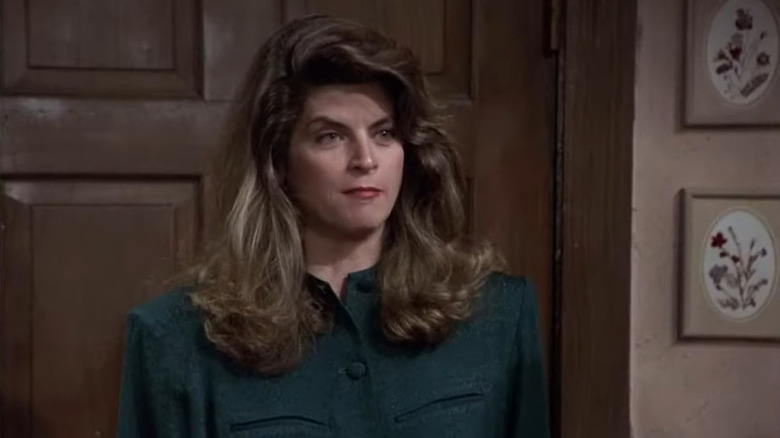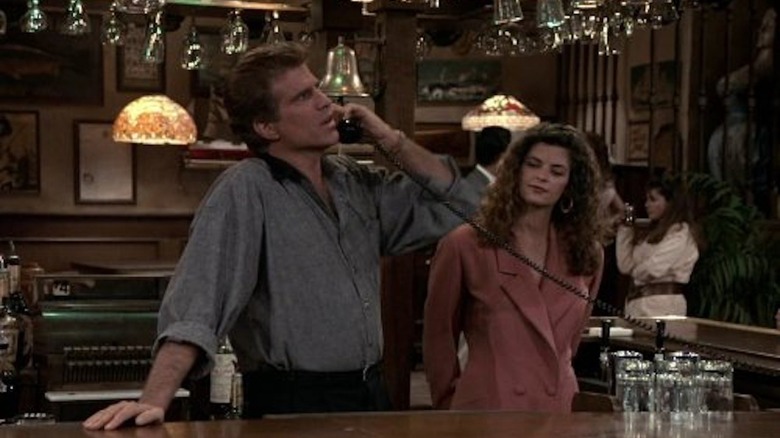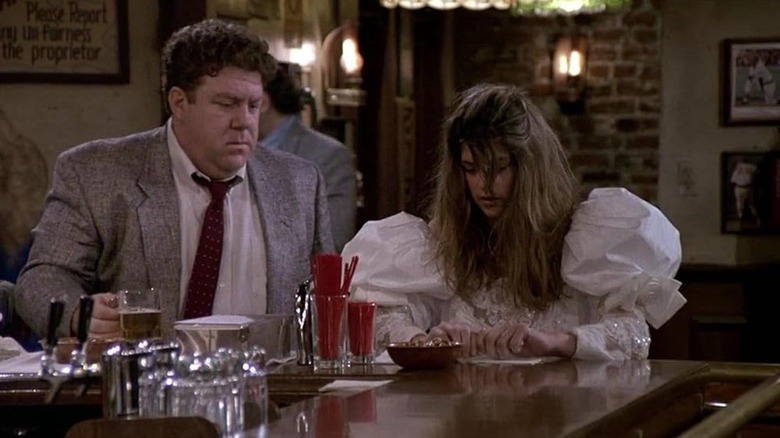The Improvised Kirstie Alley Moment That Unlocked Rebecca For Cheers' Writers
By the end of its fifth season, "Cheers" had become one of the most popular sitcoms on television. Every Thursday night, viewers tuned in to hang with the regulars at the Boston pub where everybody knows your name, and the gang always delivered. You could put the "Cheers" gang up against the very best in the history of the medium (e.g. "The Andy Griffith Show," "The Mary Tyler Moore Show," and "Taxi").
Most amazingly, the series didn't miss a beat when Woody Harrelson stepped in for Nick Colasanto after the latter's unexpected death. It just became a different kind of excellent.
And yet, as the show headed into its sixth season, no one was sure if "Cheers" could survive the departure of Shelley Long. The actor's combustible, Tracy-Hepburn chemistry with Ted Danson gave every episode the charge of the unexpected, and kept everyone in their orbit perpetually unsettled (or, in Carla's case, perturbed). Without her, the entire dynamic of the show might change, turning fans off a familiar favorite like a bar that goes from suds-and-peanuts to craft cocktails.
Would the series' writers concoct a Diane 2.0, or go in a completely different direction? They weren't entirely sure at first. In fact, they didn't exactly have a handle on their new leading lady even after they cast her.
'She'll be the dragon lady'
To commemorate the series finale's 25th anniversary, The Hollywood Reporter gathered key members of the "Cheers" team to reminisce over the show's many triumphs and very few missteps. Unsurprisingly, they acknowledged that the transition from Shelley Long's Diane to Kirstie Alley's Rebecca Howe was especially tricky — though maybe not for the reasons you'd expect.
The producers cast a wide net for Rebecca, and went with Alley in part due to a recommendation from TV comedy legend Carl Reiner (who'd recently directed her in his 1987 big-screen hit "Summer School"). But series co-creator Glen Charles still wasn't convinced she could do comedy, so, according to his brother (and also co-creator) Les Charles, they opted to play her as the bad guy. "She'll be the dragon lady," said Les, "Cruella de Vil, and make everyone else uncomfortable and funny."
The fit was initially awkward, which forced the writers to avoid the issue altogether. Per Cheri Steinkellner:
"It took a while for us to figure out where the fun was with her. In her early episodes, you can see we contrived all kinds of ways to send her into the office or out on an errand, just so we could return to the cast — and comedy we knew. It was always going to be a discovery process, but none of us knew if we were ever going to find it."
Then one day during rehearsal, Glen spied Alley nervously chain-smoking. She knew the fit was awkward, too. "I thought we could probably use that," he said. "Break down this cool, sophisticated façade she presents."
The key to bringing this out of Rebecca was to play up her unrequited love for the establishment's rich new owner, Evan Drake (Tom Skerritt). Rebecca's hard-nosed managerial style grew out of her desire to impress Drake, and she quickly realized nothing was ever going to come out of it romantically. This led to an unrehearsed moment where Alley's comedic talents exploded into full view.
Rebecca joins the bar's losers club
As Les Charles remembered, there was a bit in an early season 6 episode where Rebecca gets a call from Drake in her office. She's in the bar at the moment, so she rushes back to her office door. "Kirstie couldn't turn the doorknob," said Les. "She improvised, 'I locked myself out, no I didn't.' It's this little dithering moment. It was the first time we saw comedy potential."
The writers pounced on this, and found the perfect character to witness her vulnerability. According to Peter Casey:
"There's an episode where Norm's between jobs and starts doing house painting and Rebecca asks him to paint her office. We did a scene with them where he's painting and she comes in, breaks down and starts crying. And she was really funny crying."
From this point forward, they had Rebecca nailed. "We figured out she was not just another loser," said Steinkellner. "She was the biggest, saddest loser in the bar." So while she was Sam's boss, he now knew her toughness was an act. Best of all, while they maintained a flirtatious banter throughout the rest of the series' run, they never seriously dated. They were the best of quarrelsome friends. It was a totally different vibe from Diane, and it worked just as well in its own right.


